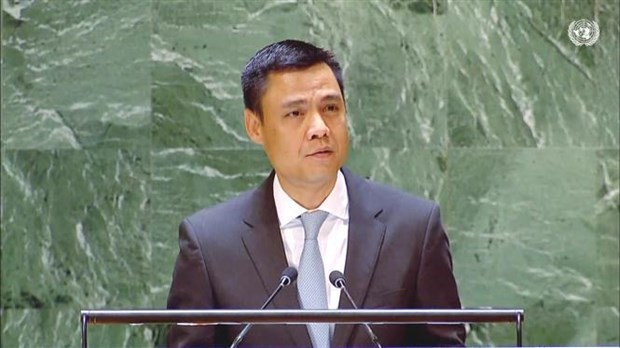 Politics & Law
Politics & Law

 |
| Ambassador Đặng Hoang Giang, Việt Nam's Permanent Representative to the United Nations (UN). VNA/VNS Photo |
HÀ NỘI As one of the countries most affected by natural disasters and climate change, Việt Nam always attaches importance to fulfilling global commitments to disaster risk reduction, Ambassador Đặng Hoàng Giang, Việt Nam's Permanent Representative to the United Nations (UN), has said.
Addressing a high-level meeting on the mid-term review of the Sendai Framework for Disaster Risk Reduction 2015-2030, which was held in New York on May 18 and 31, Giang noted that Việt Nam advocates shifting from passive response to proactive prevention.
Therefore, the country prioritises the implementation of measures to raise public awareness and maximise domestic resources as well as international support to improve disaster response capacity and ensure progress toward the Sendai Framework goals, he said.
Việt Nam actively contributes to global and regional efforts to mitigate disaster risks, which has been reflected in its Chairmanship of the ASEAN Disaster Management Committee in 2023, and its deployment of search and rescue forces to help Turkey deal with the devastating twin quakes last February, the ambassador went on.
He proposed three major solutions to push ahead with the implementation of the Sendai Framework in the time ahead, saying disaster risk reduction should be put at the centre of socio-economic development strategies and policies to achieve Sustainable Development Goals (SDGs), with adequate investment in disaster risk management and prevention infrastructure ensured.
Giang also suggested strengthening global and regional partnerships in disaster risk reduction, especially in information and technology sharing, and towards building centres of data and early warning of disasters at all levels.
At the same time, it is necessary to improve current multilateral mechanisms to effectively respond to disasters, especially in the cases where natural and man-made disasters occur at the same time, he said.
The meeting, which brought together representatives from 192 UN member states and international organisations, adopted a political declaration to renew commitments and accelerate the implementation of the Sendai Framework.
In her remarks, UN Deputy Secretary-General Amina Mohammed noted that the global progress towards disaster risk management has been weak and insufficient.
Given this, she called for enhancing multilateral cooperation to raise self-resilience and recovery capacity by improving the awareness of disaster risks, upgrading administrative and financial systems at both national and international levels, shifting from disaster management to risk management, and focusing on prevention. VNS




